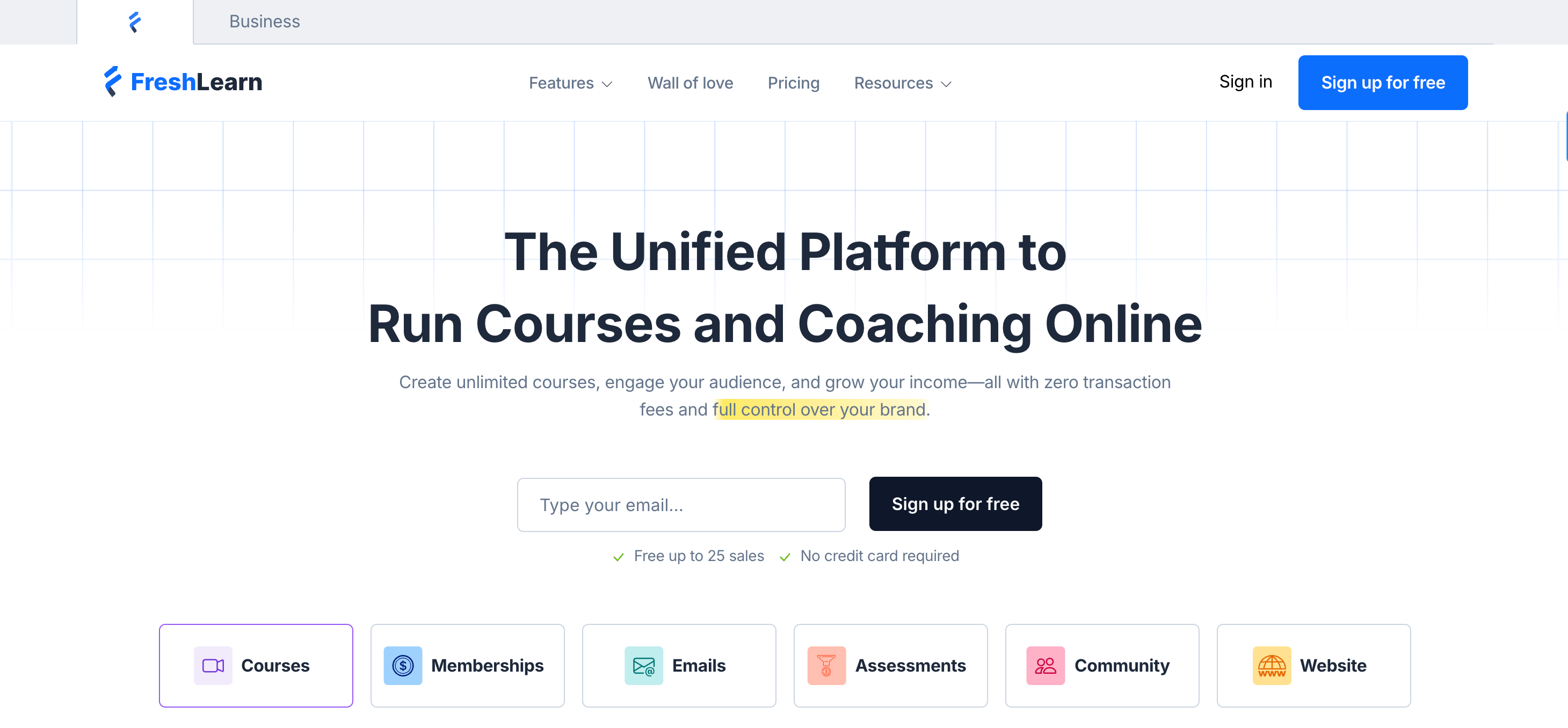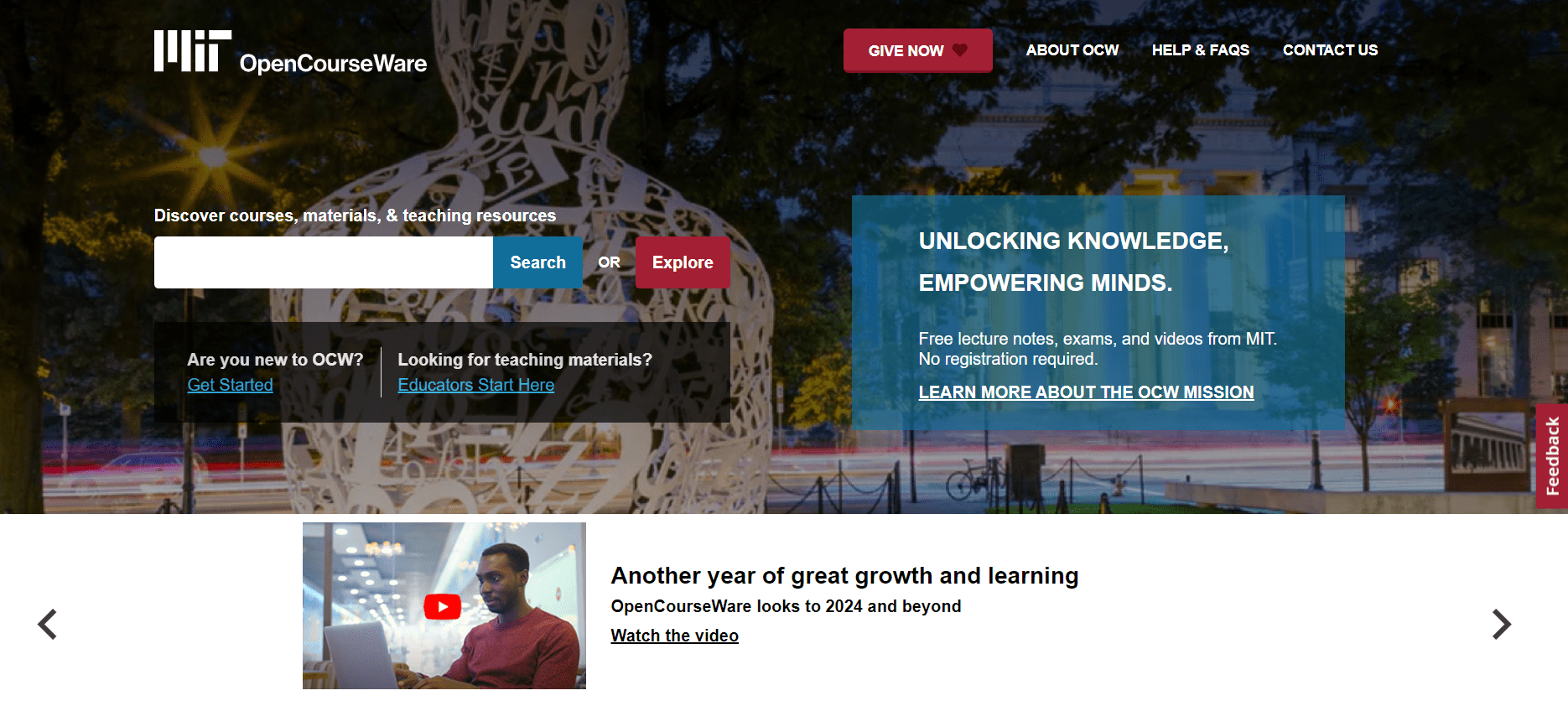
Top 11 Coursera Alternatives 2026
Introduction
The e-learning sector has expanded at a rate of 900% in the last two decades. Online learning platforms don’t just cater to school and college students anymore. Massive open online courses (MOOCs) have made it feasible for everyone to enroll in and earn credit for courses taught by renowned professors at top institutions across the globe.
With the goal of professional development, people turn to online courses to attain new and crucial job skills. In fact, the market for MOOCs is expected to reach $25.33 billion by 2026.
When people talk about the best massive open online courses, they usually think about Coursera. Nonetheless, if Coursera isn't suitable for your requirements, several competitors and alternatives are available.
Let’s look at 10 Coursera alternatives and weigh their pros and cons to find the best fit for your needs.
What is Coursera?
Coursera is a US-based online learning platform built by Stanford professors Andrew Ng and Daphne Koller. It is popular among students who want to earn certifications and degrees in various subjects.
Coursera stands out because of its interactive study material, including quizzes, on-demand videos, and more tools. Students also enjoy a dedicated community that is invested in discussing professional growth and projects.
Coursera pros:
- Coursera offers over 7,000 courses in diverse subjects, such as sciences, languages, humanities, IT, and business management.
- It enables online learning for remote education.
- Leading universities offer degree programs, and reputed companies, such as Google and IBM, offer certifications on this online learning platform.
Coursera cons:
- It can be expensive compared to all the other competitors and alternatives.
- Students might need to commit a lot of time to earn certificates and degrees that span months or even years.
Coursera Pricing:
Best Coursera Alternatives
Many Coursera alternatives offer features similar to or even better than Coursera at an affordable price. Each online learning platform comes with its own set of pros and cons and is suited differently for different needs. Here’s a list of our top Coursera alternatives we think you should check out
1. FreshLearn
If you’re looking to monetize your expertise, you might want to consider FreshLearn. This web-based online learning platform lets you create courses, cohorts, digital downloads as reading materials, and more.
You can create courses and sales pages tailored to your students' needs and keep 100% of the earnings. FreshLearn has enabled more than 15,000 businesses to earn $ 20 M+, and you can be one of them!

Pros:
- User-friendly: FreshLearn has a user-friendly interface with eye-appealing and easy-to-use dashboards. Course creators don’t need technical expertise to create, edit, and sell their courses.
- Comprehensive feature set: FreshLearn offers a wide set of tools to create engaging course material. You can take advantage of its drag-and-drop editor, drip content, focus mode, and sales page builder.
- Affordability: FreshLearn offers a free plan and two affordable paid plans with pricing starting at just $29 per month.
- Great customer support: FreshLearn users love its customer support team for its prompt responses. Check out the expert review of Freshlearn by EVS, showing fast response rates to resolve issues and a complete test of what the platform does.
- Continuous development: FreshLearn launches new features and updates on a timely basis, taking user feedback into account.
- White-labeling: Customize courses for any platform by removing the Freshlearn branding. Customize it to build your own brand identity.
- Affiliate management and reports: Create an affiliate network of courses and get detailed reports on how your courses perform. You can also keep track of students' performance. Mobile-ready: FreshLearn offers a mobile-friendly interface that you can access from anywhere on the go.
Cons
- People who are very technically savvy may not be interested in Freshlearn as it is a no-code platform.
Pricing
FreshLearn has a forever-free plan with all the essential features to get you started. Beyond that, it offers flexible paid plans designed to scale with your growth, including the Pro, No Brainer, No Brainer+, and Enterprise plans.
- Free Plan: $0 (No Transaction Fee)
- Pro Plan: $39/month (When you are billed yearly, $37/month)
- No Brainer Plan: $79/month (When you are billed yearly, $59/month)
- No Brainer + Plan: $149/month (When you are billed yearly, $119/month)
- Enterprise Plan: $249/month (When you are billed yearly, $169/month)


2. Khan Academy
Salman Khan launched the Khan Academy in 2008 to assist his cousin with tutoring. Since then, it's become a popular non-profit online learning platform and one of the best Coursera alternatives for elementary and high school students.
It offers great resources to learn basic subjects and gain supplementary training in math, physics, and economics. You can access free courses at Khan Academy at any time and learn at your own pace.

Pros
- Free and accessible: Khan Academy is popular for democratizing education, offering cost-free videos on various subjects, such as maths, chemistry, biology, and more.
- Learn at your own pace: Students can pause, rewind, fast forward, or repeat videos based on their learning pace. Take it slow if you need more time on a topic, or breeze through it if you don’t need help.
- Personalized support: In addition to learning objectives and progress monitoring, Khan Academy provides users with individualized feedback on improving and reaching goals. You can ask questions or seek support if needed.
- Math problems: Khan Academy will randomly generate math problems for more training. Each problem comes with a step-by-step solution.
Cons
- Not designed for higher education: Khan Academy offers basic concepts in school education. It’s not suitable for developing technical skills or professional development.
- Might not be very reliable: The platform has a reputation for providing students with dependable, accurate, and up-to-date information, but it falls short in areas that need additional research.
- Lack of relevant support: Users of Khan Academy may not always get the most helpful recommendations or assistance since the platform mostly depends on automated answers.
Pricing
Khan Academy is free for all its students to use.
3. MIT OpenCourseWare
MIT OpenCourseWare (OCW) is a 2001 brainchild of the Ivy League Massachusetts Institute of Technology. This online learning platform helps students of various disciplines in higher education master their subjects. It’s a great resource for high-quality courses that complement traditional educational models, especially for students who need formal accreditation with verified certificates.

Pros
- Access MIT’s curriculum: MIT OCW offers free courses that may cover almost all the material of MIT classes, including resources from every field of study, ranging from the arts and social sciences to physics and engineering.
- Absolutely free: Get access to high-quality courses and resources for absolutely free. This is one of the few free Coursera alternatives in our list that makes education available to anyone anywhere with a stable internet connection.
- No need to register: You don’t have to register to take advantage of MIT OCW. This makes the platform convenient and easy to get started with.
- MIT commitment: Running MIT OCW costs around $4 million per year, demonstrating MIT's substantial commitment to providing these learning materials to the public.
Cons
- No degrees and certifications: While MIT OCW offers great courses to let students learn at their own pace, it might not be the right choice for those who need degrees or certifications.
- No personalization: Some users may find that MIT OCW's lack of personalized learning paths limits how much they may benefit from the platform's specialized learning experience.
- Can’t engage with instructors: You can’t directly interact with the instructors. This is a considerable drawback since it may affect the depth of understanding, and students learn better through engagement during the course.
Pricing
MIT OpenCourseWare is free to use for everyone.
4. Udemy
Udemy is one of the top alternatives to Coursera, as it is a leading online learning platform with a strong selection of reasonably paid courses. It’s a great option for those who want to learn new skills or gain more training to hone their current skill set will find it useful. It provides classes in various subjects, including business, photography, computer science, cloud computing, software development, and more.

Pros
- A diverse range of courses: Udemy has more than 210,000 courses in a wide range of subjects and skill levels, including art, personal development, technology, and business.
- Affordability: Udemy makes learning accessible to many since courses are priced affordably and sometimes have considerable discounts.
- Lifetime access: You get lifetime access to any course you purchase on Udemy. Students learn at their own pace from the comfort of their own homes at any time.
- Courses by industry professionals: Udemy offers some high-quality courses curated by experts. This way, students learn through high-quality course content and valuable insights.
- Interactive features: Udemy courses offer training via engagement with interactive quizzes, graded assignments, and a Q&A section to enhance their learning experience.
Cons
- Course quality varies: Anyone can become an instructor on Udemy and create a course. Some of them may not be professionally prepared.
- No formal accreditation: You may not be able to use what you learn in an unaccredited Udemy course toward your degree or certification.
- Inconsistent pricing: Prices of courses vary greatly, which makes it difficult to judge a course’s true value.
Pricing:
5. Alison
Alison is an online education platform based in the UK that boasts students from over 190 countries. In contrast to Coursera, Alison does not have a degree in a particular field but provides training certifications in digital marketing and project management like many of its competitors and alternatives listed below. Business and technology take center stage on the platform, with healthcare as a secondary focus.

Pros
- Free courses: With Alison, students learn from 4,000+ high-quality courses for free. It includes a wide range of subjects for professional development, such as computer science, machine learning, web development, graphic design, and more.
- Get certified: An official Alison certificate or diploma is available for purchase upon completion of training; this may be included in your resume, social media accounts, and job applications.
- Interactive course material: Many Alison courses include high-quality video lectures, study guides, quizzes, projects, and final tests to make studying more engaging.
- Learn from the experts: Gain knowledge from renowned professionals, such as those at Google, Saylor, and Microsoft, guaranteeing top-notch information and insightful analysis.
Cons:
- Advertisements: Ads disrupt student learning in the free plan. If you want to avoid advertisements, you may upgrade to a premium plan.
- Issues with device compatibility: Many iOS users report issues with the Alison website not being optimized for their devices. This might possibly impact the student's learning progress in the course.
- Paid certifications: The classes themselves are free. However, getting a certificate in digital, physical, or framed form comes with a fee.
Pricing
6. LinkedIn Learning
LinkedIn Learning is an online resource that provides access to several professional courses from well-known instructors. Users can upgrade their skills with LinkedIn learning and simultaneously look for opportunities on LinkedIn. The online learning portal includes beginner-friendly video lessons for every course.

Pros
- One-month free trial: If you have a LinkedIn profile, you can access all of LinkedIn Learning’s 17,000+ courses for free during its one-month free trial.
- Sharable certification: When you complete a course in LinkedIn learning, you get a certificate that you can easily add to your LinkedIn profile.
- Learning language options: LinkedIn Learning offers high-quality courses that are accessible in different languages and are created by subject matter experts.
- Affordability: LinkedIn Learning is a low-cost option compared to other competitors and alternatives.
Cons:
- Certificates aren’t accredited: You can’t use LinkedIn learning certificates to get credit in colleges and universities.
- Outdated content: Many courses received criticism for not being fresh and up-to-date.
- Paid content: Once your free trial is over, you must pay a subscription fee to access most courses.
Pricing
7. EdX
In 2012, Harvard and MIT established EdX, a nonprofit platform that hosts high-quality courses from more than 100 universities, organizations, and non-profits. It serves a worldwide student body by providing access to affordable, university-level courses in various disciplines, such as computer science, data science, artificial intelligence, cloud computing, psychology, and more.

Pros
- Wide range of programs: A wide variety of educational options are available on edX, from standalone classes to online master's degrees and certifications.
- Prestigious partners: EdX offers high-quality courses in collaboration with leading universities and industry leaders.
- Flexible learning options: Professionals with varying goals may find what they're searching for on edX, with programs like MicroMasters and boot camps addressing various professional development and training needs.
- Accreditation: Many courses offered on edX by leading universities can offer credit that adds value to your degrees and certification.
Cons
- Costly: The individual paid courses may seem inexpensive, with prices ranging from $50 to $300, but the degree and professional programs may be rather pricey, with a Master's degree costing up to $25,000.
- Quality may vary: Despite partnering with leading universities, edX courses vary in quality. Some criticize the course delivery and technicalities.
- Platform usability: The platform's UI and course contents may lack interactive elements, which may hinder the learning experience for certain users.
Pricing
8. DataCamp
DataCamp is an online learning platform that provides courses and certifications in data science, AI, machine learning, programming, and statistics. The classes are designed to help students learn and implement the skills in their respective fields. Datacamp stands out among other IT-focused competitors and alternatives because it assists in job placements by training them for interviews and providing personalized resume reviews.

Pros
- Interactive learning materials: The interactive nature of DataCamp courses facilitates student engagement and training. Applying the course content via exercises, projects, quizzes, and assessments helps students learn and retain knowledge longer.
- Wide range of courses: You may choose from various data science and programming courses. Students learn with the fundamentals and work up to more complex topics.
- Free courses: DataCamp offers many beginner training courses for free, and registration doesn’t require any financial information.
- Skill and career tracks: Skill and Career Tracks are some of DataCamp's organized learning pathways that students may use to acquire more depth in a particular field.
Cons
- Cost: To access all of DataCamp's courses, including the free ones, you'll need to subscribe. The price point can be an obstacle for those seeking a more affordable choice.
- Complex UI: Overall, the software is user-friendly, although complete newcomers may struggle without guidance.
- Course difficulty variances: While most people have positive things to say about the courses, a few complain about the unequal difficulty levels of the assignments.
Pricing
9. Udacity
Udacity is remarkable among other alternatives to Coursera for its job-focused Nanodegrees, which include one-on-one mentoring and career coaching. It was founded in 2011 and has over 160,000 students.
Udacity provides over 500 professional courses in data science, computer science, business, and programming. It has become the premier platform among other competitors and alternatives to build technical skills due to the rich hands-on learning and training opportunities and individualized feedback.

Pros
- Upgrade your technical skills: Courses offered by Udacity are excellent for advancing one's career in tech companies. Students learn skills pertinent to specific job markets because of the courses' heavy focus on hands-on projects.
- Easy-to-use platform: Udacity emphasizes high-quality experience. The online learning platform's user-friendliness makes finding and navigating courses a breeze.
- Flexible learning options: Courses are created with flexibility in mind so they can accommodate learners with busy schedules and those who want to learn according to their own schedules without needing certified credentials.
- Offers scholarship and installment payments: Udacity does not take government funding. However, it does have scholarships from other third-party groups. You may also pay for your Nanodegree monthly with the Affirm financing option.
Cons
- High cost: Despite its funding options, its high price is a significant drawback. Some courses cost up to $399 per month, making Udacity one of the pricier online learning platforms and Coursera alternatives.
- Limited course selection: The course selection is slightly restricted compared to other online learning platforms, emphasizing technical and programming-related subjects.
- No accreditation: Employers or institutions may not recognize Udacity courses or Nanodegrees as valid options for continuing education since they are not accredited.
Pricing:

10. Pluralsight
Pluralsight is an online education portal focusing on technology-related courses, including web development, data science, software development, and more. The platform's on-demand video courses, practical assignments, and tests are all part of an effort to provide users with modern skills and resources for advancing their careers.

Pros
- All-rounded skills development: Pluralsight provides courses in software development, information and cyber security, IT operations, and other tech-focused fields. It also offers creative topics emphasizing the holistic professional development of learners to advance their careers.
- Learning with cloud labs: Users may get hands-on experience with cloud development tools in Pluralsight's one-of-a-kind cloud labs without taking unnecessary risks.
- Course Variety and Learning Paths: Pluralsight accommodates novices, intermediates, and specialists alike with its extensive library of courses and learning pathways. It allows users to progress technologically and acquire future-proof abilities.
- Podcasts: Pluralsight provides podcasts on many subjects to make technology education more engaging and approachable.
- Offers individual and organizational plans: Pluralsight offers two plans, Pluralsight Skills and Pluralsight Flow. Pluralsight Skills caters to self-directed learners, and Pluralsight Flow is a powerful learning management system for organizations to optimize their team’s workflow.
Cons
- High cost: Pluralsight skills for teams can be on the costlier side, with pricing starting at $399 per user per month.
- Limited course selection: There is a heavy emphasis on tech-related courses; if you want to learn about more general subjects, you may want to check out other Coursera alternatives.
- No interaction with instructors: There is little room for student-instructor dialogue since the classes are pre-recorded. This may limit student’s understanding and engagement in a course
Pricing
Pluralsight Skills:
Pluralsight flow:
11. Code Academy
If you want Coursera alternatives specifically for coding, Codeacademy offers hands-on experience in 12 programming languages, including Java, Python, SQL, HTML, and more. Be it a novice or an advanced student, you’ll find a course that fits your needs in web development, web design data science, and more.
Pros
- User-friendly interface: Code Academy offers easy navigation and simple features. This makes it perfect for those who are new to coding.
- Interactive learning: Code Academy engages its students with hands-on learning materials, such as quizzes, projects, simulations, and other interactive experiences.
- Community support: Students at Code Academy are part of a tight-knit community where they may interact with instructors, classmates, and subject matter experts alike.
- Variety of tech-courses: Code academy of haven of coding knowledge with courses that cater to different interests and job skills related to IT and programming.
Cons
- Limited depth in free content: The free content on Code Academy may suit beginners, but the advanced topics will require one of the premium memberships.
- Not Accreditation: The lack of accreditation for the certifications might make them less credible when used in more official academic or occupational contexts.
Pricing:
Wrapping Up
There you have it—ten + bonus Coursera alternatives that offer high-quality courses for different levels of education and professional development. With so many online learning platforms to explore, pick the one that focuses on your domain the most, be it business or technology. Weigh the pros and cons of each platform and compare pricing and features carefully.
FreshLearn stands apart from all the Coursera alternatives because of its user-friendly design, extensive course catalog, interesting learning materials, and unwavering commitment to excellence.
If you want to expand your knowledge, improve your skills, or pick a new professional direction, FreshLearn is a great choice to help you learn and succeed. Try it now for free today and see what FreshLearn has to offer!



